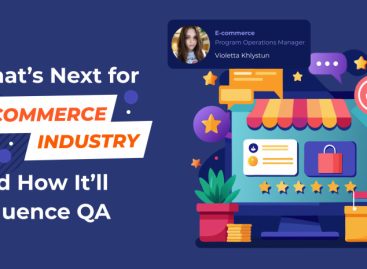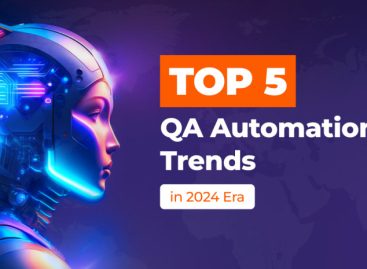- QATestLab Blog >
- QA Trends >
- Artificial Intelligence: adoption and obstacles
Artificial Intelligence: adoption and obstacles

2018 is a year of Machine Learning and AI (Artificial Intelligence) technologies. They attract a lot of attention including media coverage making companies to explore and adopt AI technologies. Time to turn talks into action has already come.
AI is very prospective, and it opens new opportunities for different business. According to the Spending Guide conducted by IDC (International Data Corporation), in 2021, worldwide spending on AI is expected to reach US $57.6 billion with CAGR (Compound Annual Growth Rate) of 50.1% over 2016 – 2021.
Adoption of AI by industries
According to the study provided by Juniper Research, retailer spending in 2022 is expected to be distributed in the following way:
- 54% – customer service
- 30% – marketing with AI implemented
- 16% – demand forecasting
By 2022, retailers would spend US $7.3 billion annually on AI technologies and tools. The main goal is to improve the quality of provided services spending less investments.
For consumer services, AI adoption still triggers a lot of misunderstandings. According to the survey by PointSource, 54% of US consumers prefer to interact more with human service representative than with chatbots. Besides, 80% of consumers would like to communicate with human in case of receiving medical information. Despite the lack of consumers’ trust, the US healthcare industry combined with AI technologies is expected to produce $150 billion savings annually by 2026. The data are provided by the analysis by Accenture, a consulting company.
According to the survey conducted by MIT Sloan Management Review, an independent research and ideas provider, less than a quarter of 3,000 surveyed companies have already implemented AI technologies. 23% of survey participants are in progress of AI adoption. So, the majority of companies have not implemented AI technologies yet. There is a couple of reasons for that.
Challenges of AI adoption
AI adoption promises the increase of revenue, but at the same time it requires high investments. According to the survey conducted by Vanson Bourne, a research company, the majority of companies expect to have their investments doubled in 5 years and tripled in 10 years.
For 40% of surveyed companies, lack of IT infrastructure is an obstacle to AI adoption, despite the fact that companies with $50 million revenue took part in the survey. The matter is that AI-based systems require specific hardware and software combinations. AI algorithms are rather resource-consuming as they process a large amount of data. Moreover, AI infrastructure should be flexible and scalable.
According to the survey conducted by Vanson Bourne, lack of talent is a barrier to AI adoption for 34% of companies. Beside that, new strategies should be developed and properly implemented. So, 62% of surveyed companies will hire a Chief AI Officer. Nowaday, a pool of AI experts is not no large.
AI impact on human work
The Vanson Bourne survey informs that 95% of companies are sure that the implementation of AI technologies will change the specifics of human work by 2030. And 21% think that AI algorithms would fully replace human specialists.
But robots will not steal jobs. According to Gartner, 1.8 million of jobs will disappear because of AI technologies by 2020. Nevertheless, 2.3 million of new specific jobs will be required to implement and maintain AI adoption. So, AI will remain a positive job motivator.
Learn more from QATestLab
Related Posts:
- How We Incorporate AI in Our QA Processes
- Testing the Brains of Tomorrow’s Tech – AI and ML
- QA for AI: Why to Test Already Smart Artificial Intelligence?
About Article Author
view more articles
has 3-year experince in content managing, skills of copyediting and proofreading of web content and documentation
View More Articles






No Comments Yet!
You can be the one to start a conversation.